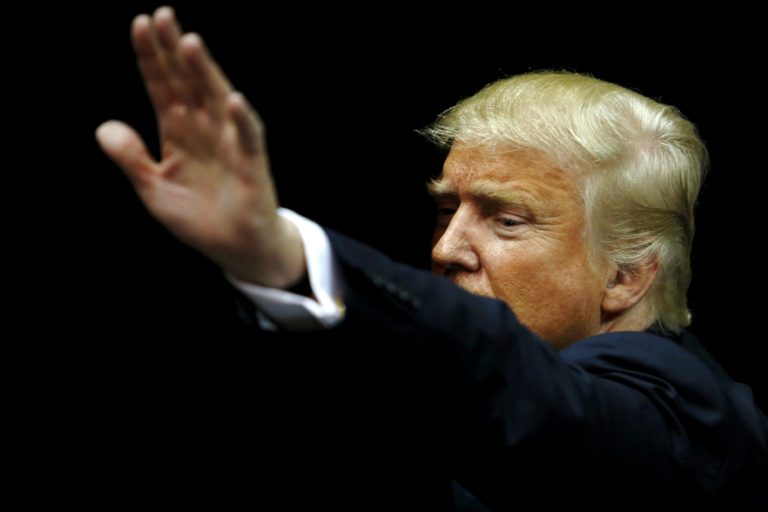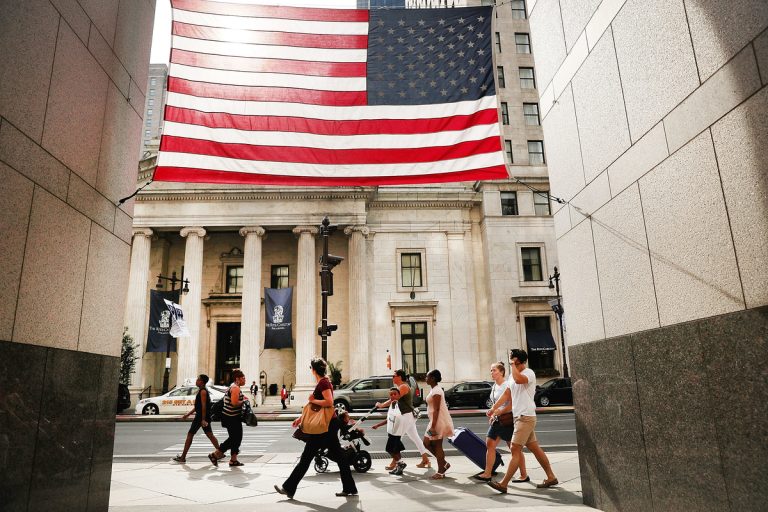
Donald Trump greets supporters after speaking at a campaign rally in Albany, New York. Image by Eduardo Munoz Alvarez/Getty Images, © All Rights Reserved.
Looking at Trump and Seeing Ourselves
In mid-March, I was the guest speaker at a graduate seminar on democracy, a racially diverse class that had mastered the art of talking openly and honestly across their lines of difference. For a while we explored American history and political theory, then we turned to the presidential race.
A white student reminded us that David Duke had urged white supremacists to support Donald Trump as a way of advancing their “racial purity” goals. She spoke of how distressed she was that Trump had taken 24 hours to disavow Duke’s support, first saying he knew nothing about this infamous man — a notorious anti-Semite and former Grand Wizard of the Ku Klux Klan — when there’s clear evidence that he did, as do most people who read the news.
She went on to say that she was “truly shocked” at the blatant racism, bigotry, xenophobia, and misogyny in Trump’s public utterances — and at the fact that millions of Americans support his candidacy in spite of all of this.
An African-American student spoke next: “I have to say that, in my view, a great deal of Trump’s support is not in spite of the hateful things he says but because of them.” She continued,
“My black friends and I get almost amused when our white friends tell us how shocked they are at what they’ve seen about this country since Trump began winning primaries with millions of votes.
We’re not at all shocked. White supremacy in the U.S. has never been hidden from us. We’ve known about it for a long time, ever since the first black person was enslaved and shipped to these shores. For generations, we’ve had to be on high alert, lest America’s deep-rooted racism bring us down. Trump simply puts it out there where more people can see it.
Just this morning [here she teared up] I had to stop my beautiful 14-year-old son as he was about to go to school and remind him to take off his hoodie. I won’t allow him to wear it lest someone should see his hoodie and black skin as justification for shooting first and asking questions later. Yes, high alert all the time…”
Watching the class and myself react as this woman spoke, I saw how being compelled to look at hard realities that elude most white Americans can pry open our eyes, our minds, our hearts. Then I realized that I’d found what I’ve been seeking — something potentially redemptive about the sordid, shameful, soul-sucking spectacle called Trump and his campaign.
Maybe, just maybe, Trump’s hateful bloviating will give us a chance to look at ourselves in the mirror, to be appalled by what we see, and to redouble our efforts to clean up our act. Maybe we will develop antibodies to some of the toxins with which our body politic is laced, or at least become more honest and humble about how unwell we are.
Trump is a one-man microcosm of much that’s diseased about American culture: its crudeness, its greed, its braggadocio and bullying — both born of profound insecurity — its lack of empathy, its false equation of wealth with success, its eternal need for “an enemy,” its nativism, its racism, and DNA-deep commitment to white supremacy. The more he rubs our noses in our own pathologies — peddling a version of “greatness” that would be comic if it were not twisted, tragic, and lethal — the more it becomes at least possible that his ugly campaign will strengthen our resolve to make America confess and repent, again and again and again.
Of course, nothing of the sort will happen as long as we focus exclusively on “him” and “them,” as if defeating “the enemy” will do the trick. As that great guru Pogo said nearly fifty years ago, “We have met the enemy and he is us.”
If you are white like me, it’s unlikely you’ve had a life that’s forced you to look at what people of color must look at every day in order to survive. If you are white like me, it’s likely you’ve been supported by a culture of white supremacy whether or not you asked for it. Are you and I willing to see ourselves reflected in Trump, to say that what’s repugnant in him finds resonance in us?
To date, many leaders of the Republican Party have distanced themselves from their presumptive nominee, some even telling reporters that they will answer no more questions about him. That’s understandable, since the farther away from the mirror you stand, the less you can see of the gruesome details. But, again, what about you and me?
Seeing our own reflection in the mirror of Trump will take time and courage. But it begins with a simple step. We must reject the fiction that Trump’s appeal lies not in his bigotry, racism, and xenophobia, but in his promise to restore lost jobs and lost homes and to curb terrorism. Trump has no viable solutions for these problems. He has only Mexican and Muslim scapegoats on whom to blame them — along with the arrogant and ludicrous claim that if we put him behind the wheel, “It will be great. Trust me.”
Under the slightest scrutiny, Trump’s “cures” for our ills prove not to be so great — though for his enablers they do provide great camouflage for the dark impulses that drive his campaign:
- On restoring economic security, walling off Mexico makes no sense when the business model of so many American companies depends on cheap labor. Does anyone believe that American business — which Trump claims to understand so well — will sit idly by while his wall shrinks their indecent profit margins? If you want to restore jobs and the middle class, why not incentivize those companies to offer decent wages and/or penalize them if they don’t? Why hurl obscene insults at hard-working Mexicans when the real obscenities originate in the executive suites?
- On the war against terrorism, Trump’s proposal to close our borders to Muslim immigration is equally nonsensical. Discriminating against all of the 1.6 billion members of one of the world’s great religions, even temporarily, will alienate the countless Muslim friends, allies, and U.S. citizens whose help we need to defeat the terrorist scourge that puts Muslims in peril as much or more than the rest of us. Why do we not reach out to them in the American spirit of pluralism? Might it be because of our bigotry? As for the threads of violence one can find in Islam, let’s talk about the violence laced through the Jewish and Christian traditions. After all, the Klan has Protestant roots.
Seeing our own reflection in Trump and his campaign demands that we call out his shameless exploitation of the white fear of “otherness.” That fear is amplified these days by the widely-known fact that, come 2045, over half of the American population will be people of color. The African-American graduate student I quoted earlier invites us to look at ourselves in the mirror: “I have to say that, in my view, a great deal of Trump’s support is not in spite of the hateful things he says but because of them.”
If Trump becomes President of the United States, I believe that the only way to maintain an honorable standing as an American citizen will be to say and do things that get one’s name onto his version of Nixon’s “enemies list.” I hope this column helps me make the cut.
Of course, I know full well that I mean less than nothing to Donald Trump. But here’s something else we will see as we look into his face: the only person who means anything to Trump is Trump.
Are we, too, that narcissistic? Are we, too, that uncaring? Are we, too, that cocksure that we are superior as individuals, as a race, as a nation? Are we, too, that far removed from the reach of redemption? Come November 8, we’ll find out.

